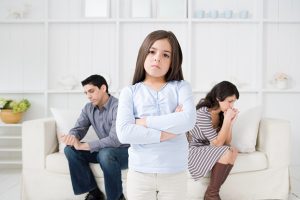
The divorce affects not only the spouses but the children as well. More than anyone, it is the child who is significantly influenced by the situation most especially if they are in their formative years. More than the change of family dynamics, shattered expectations of a family and disruption of routines, it is the removal of a parent or significant family member in the child’s life due to divorce or legal separation.
Divorce does not always mean extricating a parent in a child’s life; however, the decision to cut off the other parent –partially or wholly– might be done by the other half due to various reasons. The main reason is hatred towards an ex-husband/wife, false belief that your child is better off with you and separating your child and the other parent as a form of punishment to the ex-spouse. It might sound like a malicious act, but individuals undergoing divorce are often profoundly hurt, mistrusting and vengeful; thus, it is not rare to find wives planning revenge from their husbands especially if the cause of the divorce is extramarital affairs, leading a double life, etc. “Even if the relationship between parents was toxic and separation may be seen as a relief, separation can threaten a child’s sense of safety, create confusion and fear about the future,” wrote Dr. Veronica Brodsky, PsyD, licensed Child and School Clinical Psychologist. “Most children are not involved in the decision making, so when parents separate, all the changes that come with this decision can cause children to experience great distress.”

Methods
A parent determined to remove the other parent will employ help from different individuals such as friends, attorneys, relatives and health professionals. One of the most common methods is befriending the potential victim parent to seek consultation with a professional on how to help the child in transitioning or adapt well to the different changes in result to the divorce. With the connivance of the child development specialist or clinician, the parent frequently the father is brain-drill to the point of brainwash on the out of context version of psychological and developmental needs of the child as well the essence of providing stability, consistency, and constancy of one abode. Reiterating that shuttling the child back and forth into different homes while being detrimental; however, Dr. Frank Williams, child and adolescent psychiatrist and psychoanalyst, refuted this belief. He believed that the presence of two parents after the divorce is still the least detrimental option and changing houses, spending holidays on one parent house and packing possessions all the time are some of the nuisances to live by and accept as an aftermath of divorce.
“Even if it’s not true, even if only one parent has got this. Particularly if you have young children, then you get it to work,” notes Jamie Howard, Ph.D., a clinical psychologist at the Child Mind Institute. “Someone could be a lousy spouse and a good parent, and you really don’t want to deprive your child of a good parent; kids do better with two loving parents, divorced or married.”

Desperate parents might also use the allegation of Child Sexual abuse as means to successfully remove the victim parent. This route is most effective when the child is in preschool age and easily confused with situations. These allegations are serious and will need expert professional attention. Without disregarding the possibility of actual sexual molestation, studies show that accusations of child sexual abuse during custody battles are often false. Some are manipulative stunts. Others are results of parents’ misinterpretations, fears, and misconceptions.
Lastly and most commonly utilized method is the reasoning that cooperation and co-parenting is fundamentally impossible between the two ex-spouses since joint custody requires substantial parental participation. Sadly, this belief is second motioned by clinicians nowadays citing the writings of Dr. Richard Gardner as the source. However, Dr. R. Gardner definition of joint custody is different from that used regarding legalities and context. His description entails flexible schedule arrangement, free-flowing, alternating parental responsibilities and unstructured environment. This is a rare and antiquated definition of joint custody.
For whatever reasons, the parent wants to remove the endearing affection of the child to another parent, the effects to the child were not a priority. This is only seen afterward when the problem has grown tremendously and can provide psychological drawbacks to the child. “Its primary manifestation is the child’s campaign of denigration against a parent, a campaign that has no justification. It results from the combination of a programming (brainwashing) parent’s indoctrinations and the child’s own contributions to the vilification of the target parent,” says Richard Gardner, M.D.
